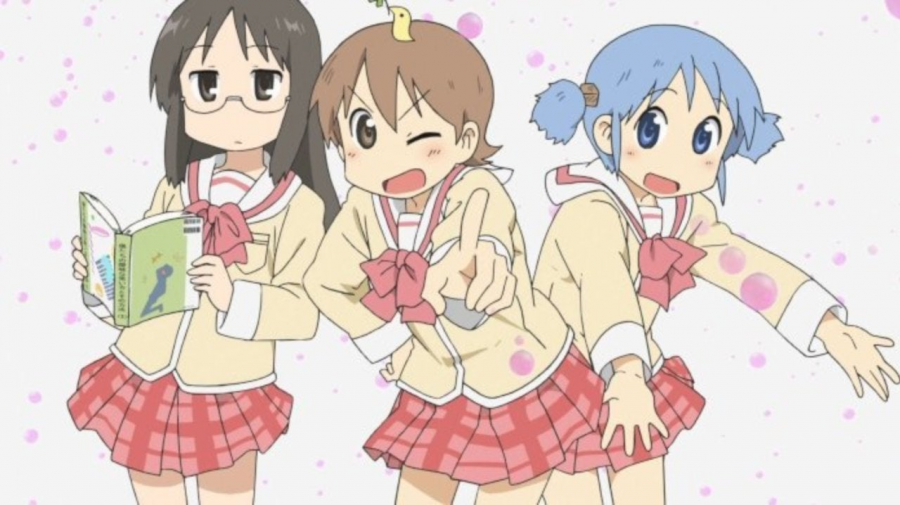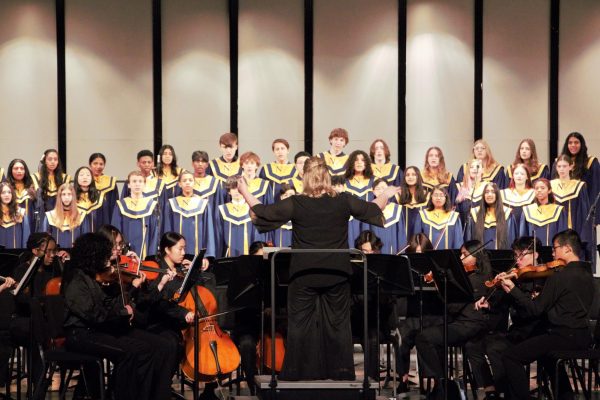Nichijou: the greatest comedy anime turns 10
Follow Yūko, Mio and Mai as they go through their “ordinary” lives.
Kyoto Animation (KyoAni) is an anime studio that has always stood out from their competitors. They’ve consistently raised the standards of anime with many of their works, and even when they aren’t pushing boundaries, series like “Tamako Market” and “K-On!” still thrive because of the kind, happy vibes that radiate from them. I would consider many of their anime to be some of the best there are in that medium because of the elaborate, sometimes nearly photorealistic animation and eloquent emotional moments that make up works like “A Silent Voice” and “Violet Evergarden.” But in terms of comedic value, nothing from their studio comes close to beating their adaptation of Keiichi Arawi’s manga “Nichijou: My Ordinary Life.”
“Nichijou” follows the citizens of Tokisadame, Japan, specifically the schoolgirl trio of Yūko, Mio and Mai, a nervous robot Nano, her young creator referred to simply as Professor and their talking cat Sakamoto. That’s really the gist of the plot because instead of a linear narrative with an overarching storyline, the show consists of vignettes that follow the people in Tokisadame, often without any coherent succession. There are also many recurring bits that punctuate each episode—“Helvetica Standard,” an irrelevant series of bizarre skits with abrupt punchlines, and “Short Thoughts,” a series of cryptic one-sentence meditations, for example—but the most consistent aspect of “Nichijou” is its eccentric, fantastical sense of humor.
I bet some of you are wondering how wacky a show with the subtitle “My Ordinary Life” could get. Many of the jokes start in a normal manner, but the progression of each one almost always ends up diverging into an unexpected, whimsical direction. For example, Misato has a crush on her fellow student Koujirou, but every time she gets embarrassed, she doesn’t just blush and overreact; she uses bazookas, gatling guns, grenades and revolvers and obliterates him. There’s a scene where Mai throws a frisbee for her dog, but right before her dog catches it, she shoots it out of the air. It’s not always on unhinged surreal tangents, but even when nothing crazy is happening, seemingly inconsequential moments like Yūko dropping her sausage and trying to catch it are escalated with a needlessly extravagant and intense score and animation style. It’s constantly unpredictable and entertaining in equal measure.
If it sounds daunting and overwhelming, that’s because it frequently is. “Nichijou” isn’t the kind of show that you should binge watch because of the incessantly blistering pace it carries throughout all 26 of its episodes, but the key to its success is that it never loses control of its pacing and timing. Whether they go on for a couple seconds or a couple minutes, each joke never feels too long or too short. It’s the perfect series for a young generation whose humor has become more about randomness than traditional setups and punchlines. Another factor that makes it so delightful is that, as always with KyoAni, the animation and soundtrack are excellent and enhance every comedic moment.
There’s as much to laugh about in this show as there is to admire in its visuals, which are spent in the most dazzling ways on the most insignificant moments, and the soundtrack maintains the pacing of each scene while also being a joy to listen to. I couldn’t think of a single aspect of this show that doesn’t excel if I tried. “Nichijou’s” blend of dreamy madcap surrealism and KyoAni’s lighthearted kindness proves to be miraculously addictive. It might seem daunting, but if you can be on the same wavelength as its nonlinear narrative, it’s as easily consumable as scrolling through social media.
But despite how arbitrary and absurd its style might be, “Nichijou” consistently grounds itself in reality, and the result is strikingly sentimental and touching. Everything about the show always feels logical and calculated; it’s never being random just for the sake of being random. Its combination of whimsical antics and the—for lack of better word—ordinary people that populate them make it seem as if the show is converting the mysteries of ordinary life to fantasies. None of the characters ever question things like the Professor’s young age or Nano being a robot. Sometimes that’s played for laughs, but a lot of the time it serves as another example of KyoAni’s signature everlasting benevolence and themes of friendship. There’s also a slight evocation of nostalgia underlining the show’s events, such as a group of children aimlessly playing during summer.
Every once in a while, though, the show has some genuinely impactful scenes—for example, after Mio sees Misato holding hands with her crush Koujirou, she ends up in a mad sprint that takes her over fences, through archery classes, on train tracks and through a river where she saves a drowning boy. Once she somehow runs out of her superhuman strength and Yūko catches up to her, Mio recounts what just happened and starts laughing. She repeats to Yūko something that she had told her earlier about baseball: “You never know what’s gonna happen… that’s why it’s fun.” It’s an unexpected and wholly flooring moment, and before you know it, the show is already moving on to another great moment.
There’s a scene in the show where a character says “Our everyday lives may, in fact, be a series of miracles. They may just be… No, I believe they must be,” and each and every scene of “Nichijou” is exactly that: a miracle in its own right. If there are any flaws within the show that I could think of, it’s that at some point it ends. It’s a truly irreplaceable, meticulously crafted work of art that transcends the slice of life genre, and I can only imagine that it will continue to grow in stature as it has for the past decade. One of the funniest and best things I have ever seen, and undoubtedly in my top three anime series.
Overall rating: MASTERPIECE
Your donation will support the student journalists of Neuqua Valley High School. Your contribution will allow us to print our next newspaper edition as well as help us purchase equipment and cover our annual website hosting costs.
Jake is a senior and a second year member of The Echo. He is co-president of the NVHS Anime Club and enjoys watching movies, writing about movies and precisely...











